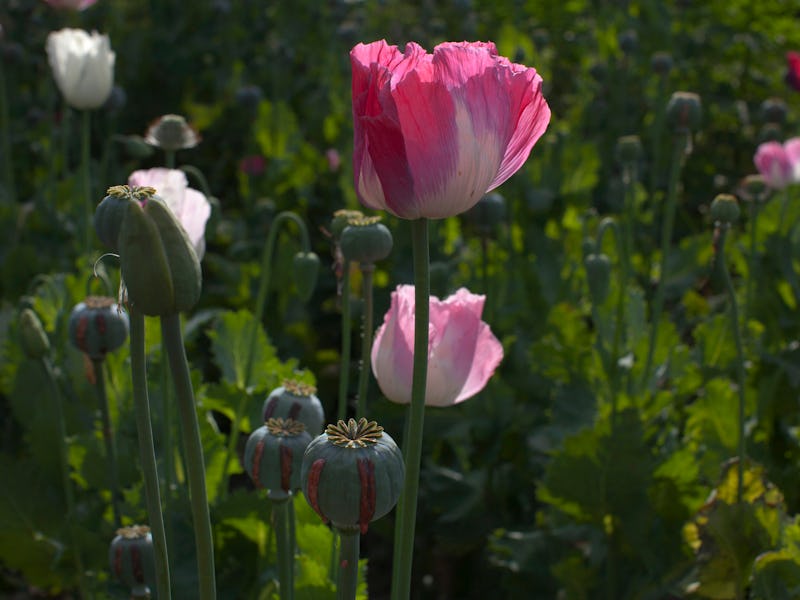It’s Opium Season in America (Pretend You Don’t Know)
One of the world's most deadly drugs could be growing -- legally -- in your backyard garden.

As far as drugs go, opium is a relic of a long-lost era of intoxication. Sure, opium’s derivatives — substances like heroin, codeine, and fentanyl — make headlines daily, but the original drug, a golden-brown poppy extract once ubiquitous in pipes across the planet, has lost its edge, at least in the Western world. Couched in cultural obscurity and relegated to Victorian-era Netflix dramas, the drug has not been very tightly policed, as evidenced by the ludicrous laws surrounding it in the U.S., which essentially suggest it’s legal to buy, as long as you don’t know what it is.
And most of us don’t: Opium poppies bloom red, white, and occasionally mauve on the borders of home gardens across America. Their tiny seeds, crunchy and grey, dot the tops of our bagels and the insides of our cakes; getting them is as easy as picking up a 99-cent packet at a Home Depot. Do said opium poppies contain enough opiates to get us stoned? Probably not; the level of opiates in different variants fluctuates. But what’s confounded lawmakers is the fact that these ubiquitous blooms are, biologically speaking, the same addictive plant that brought China’s Qing Dynasty to its knees and millions of addicts to their early deaths.
Opium pipes, like this one smoked on Netflix's 'Peaky Blinders,' were used to smoke the poppy extract until the drug's widespread condemnation after WWI.
Under the Controlled Substances Act of 1970, Papaver somniferum — together with “poppy straw” and “concentrate of poppy straw” — is considered a Schedule II substance, putting it into the same category as methadone and fentanyl — substances that have a high potential for abuse and serious psychological or physical dependence and are, not coincidentally, opium’s chemical offspring. (Poppy straw rather vaguely refers to the dried parts of the flower left over after its seeds have been harvested and are crucial to opium production.) Unless they’re dispensed by an official practitioner, they’re technically illegal to possess and use as drugs.
But who can tell, really? Growing them as food or to accentuate your home garden remains technically legal because the laws were never really resolved. The simplest strategy to ban opium and all of its derivatives would have been to ban Americans from growing poppies altogether — regardless of whether they were pipe or pastry bound — and that’s exactly what the Opium Poppy Control Act attempted to enforce in 1942. But it didn’t exactly work: Farmers that grew poppy seeds as food, many of them in California, objected to the act. Widespread ire led to a clusterfuck of protests now referred to as the “Poppy Rebellion.” Officials were forced to issue state-specific permits to farmers growing the seeds as food crops until, finally, after plenty of pushback from cultivators, the act was repealed in 1970. The distinction between its legality as a drug and as either a culinary or aesthetic garnish has remained ¯_(ツ)_/¯ ever since.
Officially, it remains illegal to grow opium poppies for drug use, but it’s generally accepted that police officials around the country will turn a blind eye if they happen to see a small clutch of the scarlet blooms adorning your backyard or pantry. And unless you’re consistently eating huge amounts of the seeds — as Elaine notoriously demonstrated in Seinfeld’s drug-testing episode — you probably won’t get busted for opium use.
Despite the law’s ambiguity, it’s best not to push your luck. A 40-acre opium poppy farm belonging to Kenneth and Shanna French, amateur (but ambitious) opium cultivators in Washington State, was shut down by the Feds in 2013 after an undercover agent caught one of them claiming to sell 500 pounds of dried poppy a month — even though he also mentioned he was selling them for “ornamental purposes.” Large-scale growers of pastry-bound seeds generally need a thumbs-up from the DEA before planting their crops.
Not that the U.S. government has the time or resources to deal with drugs of days past. These days, if it’s targeting opiates, they’re those of the pharmaceutical variety — drugs like Vicodin and Oxycontin — which have thousands of Americans in their painkilling — and occasionally, euphoria-inducing — grip. Heroin, the most notorious poppy-derived drug, also remains a problem: Demand for the life-ravaging substance has fueled the continued growth of illicit poppy seed farms across the border in Mexico and in Taliban-controlled Afghanistan, countries where opium use is still very much a reality.